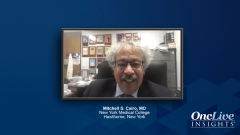
Diagnosing VOD
A review of the diagnostic criteria for veno-occlusive disease for pediatric and adult patients.
This is a synopsis of an Insights series featuring Mitchell S. Cairo, MD, of New York Medical College, and Sergio Giralt, MD, of Memorial Sloan Kettering Cancer Center.
Dr. Giralt noted one problem is differing diagnostic criteria for VOD leading to variable reported incidence. He asked Dr. Cairo to discuss diagnostic criteria, especially how they differ between children and adults and between the US and Europe.
Dr. Cairo responded the criteria are a moving target but he has published consensus criteria intended for both children and adults. Easy pathognomonic signs are biopsy showing VOD/SOS or portal hypertension without other cause, but these are rarely done. Currently, VOD is a clinical syndrome, with evolving criteria as new tests emerge. Today, he recommends diagnosis if a patient has 2+ of 7 criteria not explained by other causes: elevated bilirubin (though 20% are anicteric), weight gain, hepatomegaly, right upper quadrant pain, and Doppler evidence of reversed portal venous flow. Key inexpensive, non-invasive studies are liver ultrasound, assessing size and ascites, paired with Doppler assessing flow and resistance. In future, elastography assessing liver stiffness may help diagnosis. Dr. Cairo co-authored 2020 consensus criteria for VOD diagnosis in Blood Journal that transplant clinicians should reference.
Dr. Giralt emphasized the importance of context when evaluating VOD risk, asking Dr. Cairo whether his threshold for diagnosing VOD changes with patient risk factors. Dr. Cairo responded clinicians should be vigilant with any patient receiving conditioning therapy, but heighten suspicion with those having previous gemtuzumab or obinutuzumab, pre-existing liver disease, high ferritin, or intensive regimens putting them at 10-20% VOD risk versus baseline 1-2%. However, even low-risk patients can sporadically develop SOS.
*Video synopsis is AI-generated and reviewed by OncLive editorial staff.








































